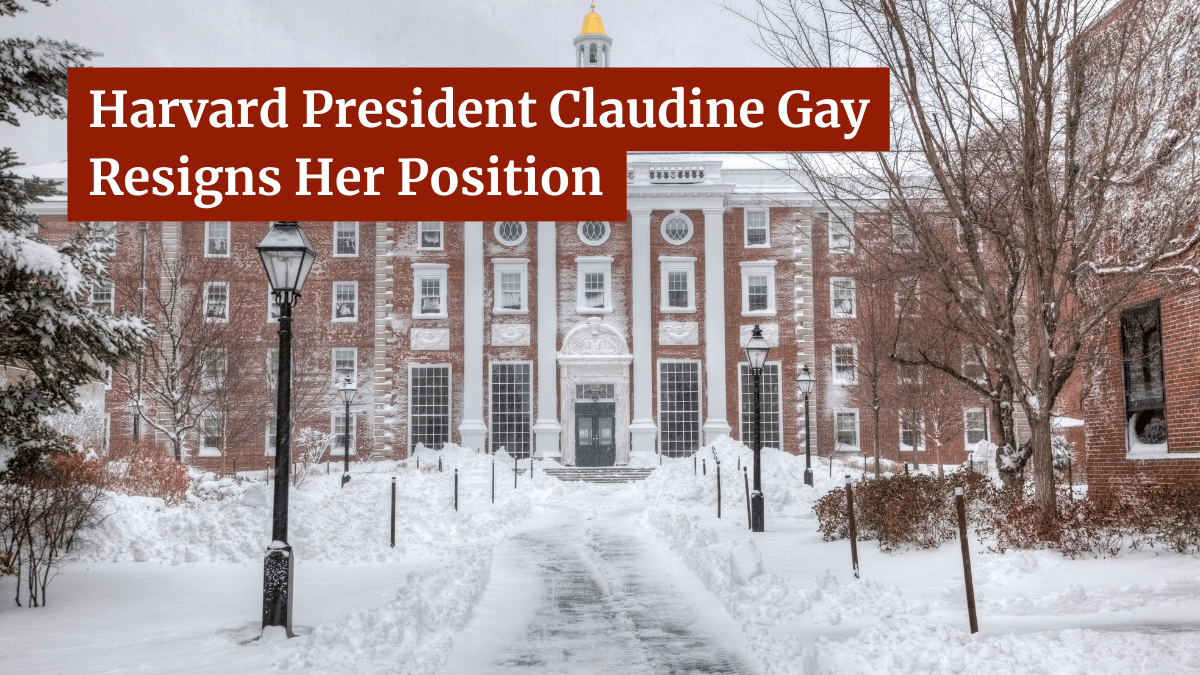Harvard President Claudine Gay Resigns

Yesterday, Claudine Gay, the embattled president of Harvard University, announced that she is resigning her post, following nearly a month of controversy. Including multiple allegations of plagiarsim.
Alan M. Garber, the school’s provost and chief academic officer, will serve as interim president until a new full-time president is appointed. Gay will return to her faculty position, where she is a professor in the departments of government and African and African American Studies.
As we covered previously, Gay was announced as the president of Harvard in December 2022, she would be the first black person and only the second woman to hold the position. She assumed office in July 2023.
However, on December 5 she and two other university presidents testified in a hearing before the House Committee on Education and Workforce regarding antisemitism in schools. The hearing was widely seen as a disaster for all three presidents, who were accused of being evasive, and one of the presidents, Liz Magill from the Universithy of Pennsylvania, resigned shortly after the hearing.
It was after that hearing that the plagiarism allegations were published to the public. Though they had been circulating since late October, when Harvard was first notified, it was only after the hearing that they were made public.
Calls for Gay’s resignation only got louder with the plagiarism allegations and they continued to grow after a second wave of alleged plagiarism were uncovered and the House Committee on Education said they would be investigating them as well.
Initially, Harvard’s board backed Gay in the face of both the hearing and the allegations. However, as the scandal dragged on, that support began to wane. Then, yesterday, a third set of allegations were published though, by then, Gay was seemingly already in the process of resigning.
The story brings an end to Gay’s tenure as Harvard’s president but it leaves open a lot of difficult questions about Gay and plagiarism in academia more broadly.
Examining the Allegations
As I talked about in the initial article, the allegations against Gay are a very mixed bag. Some of the highlighted passages are definitely worrisome and require some degree of corrective action though many didn’t indicate plagiarism at all or were examples where the copying wass so small that one couldn’t reliably prove that it was actually copied.
In the end, what I called for was for Harvard to perform a thorough and transparent investigation into Gay’s work, something that should have begun in October. However, it’s clear that didn’t happen. Harvard had over a month to get ahead of this story and failed to do so and continued to not do so after the second round of allegations came to light.
To that end, the second and third round of allegations are similar to the first, they highlight some disturbing issues that require investigation, but also include weak comparisons that don’t support the allegations.
Ultimately, there’s between 6-12 passages in Gay’s work that clearly do warrant concern and corrective action. While that is worrisome, we have to remember that this is over a 25+ year academic career. What we need, and have needed since the beginning, is a thorough investigation into her work.
If this is all there is, I would not expect a an adjunct professor or a regular researcher to face too stiff of a penalty. The articles would be corrected when possible (as long as the plagiarism didn’t invalidate the research requiring a retraction) and person would likely face a short research suspension or be required to take remedial courses. Ultimately, their career wouldn’t suffer greatly.
But the problem is that we don’t and can’t know if this is all. As new allegations have kept coming up, with at least some of them carrying weight, the hole just gets deeper and deeper. A couple of short copied passages aren’t, by themselves, that worrisome. But, as the numbers grow, so does the concern.
Sadly, we probably won’t get a complete picture of the issues in Gay’s work. However, that’s just one of the key frustrations.
The Inequity of Plagiarism
One of the elements of the story that the House Committee on Education and the Workforce said they wanted to investigate was comparing how plagiarism incidents with students were handled in comparison with the faculty and staff.
However, that is a relatively easy question to answer: Students, in general, are treated much more harshly when it comes to plagiarism than faculty and staff. This is not a problem unique to Harvard, to the higher education system or to the United States. It’s an issue across all education.
Much of it comes down to human nature. When teachers go to discipline students, they have an authoritative role. However, when they’re dealing with plagiarism by the faculty, they’re dealing with colleagues, friends and even supervisors.
It doesn’t help that, while student plagiarism is usually be investigated shortly after it is alleged to have happened, research plagiarism often comes to light months or years later. Not only does this reduce the evidence available to examine, but it makes the plagiarism feel like “old news” and as if it is less significant.
As a result, plagiarism and other ethical misdeeds that would cause students to fail an assignment, fail a class or even face suspension, get far more gentle treatment when they are done by faculty and staff. It is a double standard that is widespread, unfair and incredibly difficult to address.
However, with Gay, there’s yet another double standard. As a public figure and a politically divisive one at that, Gay’s plagiarsim allegations were never about the alleged plagiarism. Instead, they were a proxy for putting her on trial, a way of disparaging or defending her that avoided discussions of the divisive topics that made people look into the allegations in the first place.
If Gay had served the rest of her career as a largely unknown faculty member, it’s unlikely that anyone would have found these issues. If they had, it’s even less likely they would have significantly cared. The time and energy needed to investigate plagiarism mean that only public figures, in paritcular controversial ones, will likely be investigated in this manner.
The simple truth is that, when it comes to doling out punishments for plagiarism, there is almost no equity. Two people who commit very similar plagiarisms can and often will face wildly different outcomes. That’s because there’s very little consistency in what is considered plagiarism, when we check for it and how we respond to it.
That’s an issue that isn’t just pervasive in education, but in all of society, in particular in creative fields. The Claudine Gay story illustrates that in many different ways.
Bottom Line
To be clear, my biggest frustration here is with Harvard itself. They knew about the allegations in October and either refused or failed to adequately investigate the issue, even ignoring or avoiding stated processes for doing so. They missed an easy opportunity to get ahead of this issue and ended up with a tarnished reputation for it.
This case should serve as a warning to schools, when recruiting people for high-level positions, it’s important to check their body of research for plagiarism and other integrity issues. While that might not be common practice for most new hires or promotions, once someone has been selected for a position that makes them a public figure, they need to be prepared.
All that said, I have a lot of experience with these kinds of scandals. I’ve been reporting on them for 18 years. That experience has taught me that, once the scandal fades, the serious questions that the case did raise will go unanswered.
That’s because this case, like all similar scandals involving celebrities or public figures, isn’t really about plagiarism. It’s a scandal about Claudine Gay. With Claudine Gay out of the picture, soon, there won’t be any story.
Meanwhile, myself and others who focus on academic and research integrity will go back to working on many of these issues, knowing that an opportunity to raise awareness of these challenges was missed because they were in the shadow of a political plagiarism scandal.
Want to Reuse or Republish this Content?
If you want to feature this article in your site, classroom or elsewhere, just let us know! We usually grant permission within 24 hours.
